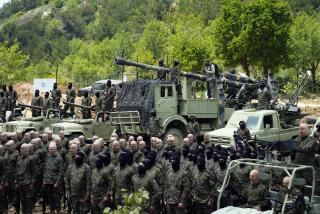Syrians to Supervise Security at Beirut’s Airport
- Share via
BEIRUT — The Lebanese government said Thursday that Syrian advisers will supervise a new security plan for the Beirut airport, where a major part of the recent TWA hostage crisis took place.
Syria, considered the real power in this ravaged nation, also is overseeing an effort to drive rival militias out of Muslim West Beirut. The streets were clear for 48 hours after the operation began at dawn Tuesday, but men armed with Kalashnikov assault rifles began showing up Thursday.
They were dressed in civilian clothes, however, instead of the standard combat fatigues. The security plan empowers police patrols to arrest armed militiamen in uniform.
No arrests were reported Thursday.
Well-Armed Police
Defense Minister Adel Osseiran said that riot police of Squad 16, heavily armed men who are patrolling the Muslim sector with an army backup, will police main roads leading to the airport on a 24-hour basis.
He said a Syrian army observer will be on hand to see that the plan is carried out. Some militiamen were seen around the terminal Thursday, but they were not in uniform and displayed no weapons.
Beirut International Airport has been involved in six hijackings in the last year.
In the latest one, Shia Muslim terrorists seized TWA Flight 847 on June 14 after it left Athens for Rome. Thirty-nine Americans were held hostage for 16 days in Beirut. The hijacked aircraft, a Boeing 727, still sits at the airport.
Landing Rights Suspended
In response to the security situation, the Reagan Administration suspended the U.S. landing rights of Lebanon’s national carriers, Middle East Airlines and the Trans-Mediterranean Airlines cargo operation.
Washington urged other nations to join an effort to isolate the airport, which it called a haven for terrorism, but with little success.
The allied Shia Muslim and Druze militias have been running the airport since it reopened in July, 1984, after a closure of several months forced by the civil war. The militias usually are allied, but have fought each other from time to time for control of West Beirut neighborhoods.
Leaders of both major militias--Nabih Berri of Amal, the main Shia militia, and Walid Jumblatt of the Druze--were among 13 Muslim leaders who worked out the West Beirut security plan at a meeting in Damascus last week.
Passengers Searched
Workmen were seen Thursday building an eight-foot-high concrete wall, topped with barbed wire, along the airport perimeter. Customs officials thoroughly searched passengers and their luggage before allowing them to board planes.
Osseiran’s announcement followed a meeting at his office of the Lebanese committee coordinating the West Beirut plan and six Syrian army observers who are here to make sure it is carried out.
The Syrian officers arrived Sunday, and 29 more are expected in the next few days. The Lebanese committee includes representatives of the main Muslim militias, the Lebanese army and police.
Meanwhile, in downtown Beirut, Muslim and Christian gunmen continued their decade-long battle. Mortar and grenade duels raged all night at the three-mile-long line that divides the capital, but faded to sniper exchanges Thursday morning.
Police said said three people were killed and nine wounded.
Government troops and Druze militiamen fought tank and artillery duels around the hilltop town of Souq el Gharb above Beirut, starting brush fires and destroying several houses, police reported.
More to Read
Sign up for Essential California
The most important California stories and recommendations in your inbox every morning.
You may occasionally receive promotional content from the Los Angeles Times.










